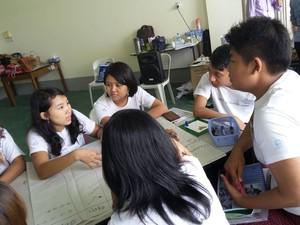
As Myanmar opens up, it is essential that focus remains not only on the country’s economic potential, but on the health and well-being of its citizens. To that end, Yangon University of Economics’ rector welcomed a recent UNESCO-led sexual and reproductive health (SRH) and HIV training programme for youth leaders held at the school.
“As our country is in the process of reforms, this kind of training program is very important for us to ensure our students are focusing not only on their academic studies but also on the country’s health and development agenda,” said rector Dr Khin Naing Oo in her remarks at the opening ceremony.
A total of 32 students took part in the programme, carried out jointly with the Youth Development Program of the Myanmar Medical Association and held for a total of six days between 10-19 June.
The course covered the basics of male and female reproductive systems, HIV knowledge, and risks youth face, while also focusing on advocacy, through sessions on how to communicate effectively, peer education, and conducting presentations. The aim was for participants to become involved in peer education to ensure that others at the university have basic knowledge on SRH and HIV.
Organizers sought to engage students in the material being taught by encouraging discussion and interactivity in the sessions, emphasizing two-way learning.
One session, “The Way Forward,” was devoted to students sharing their own innovative ideas to increase awareness about SRH and HIV. One group discussed how they had set up a Facebook page on the first day of the training to share HIV and sexual and reproductive health knowledge with their friends, while another committed to “edutainment” activities on the topics at upcoming university events.
“We always welcome this kind of interactive training in our university,” said Rector Dr Khin Naing Oo in her closing remark. “Thanks to UNESCO, the training team of the Youth Development Program and all the teachers and staff who supported the training and our pupils who actively participated.”
UNESCO also supported similar trainings in East Yangon University and Dagon University in December 2014 and January 2015 in collaboration with the Youth Development Program of Myanmar Medical Association.
Contact: Pyi Pyi Phyo at pp.phyo@unesco.org
